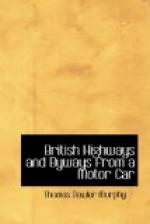The splendid dark-oak paneling that reached to the ceiling of the dining room and the richly carved mantel-piece, they told us, were once in rooms of Ludlow Castle. As we sat at our late dinner, a familiar melody from the sonorous chimes of the church-tower came through the open window to our great delight. “O, what a nuisance those bells are,” said the neat waiting maid, “and a bad thing for the town, too. Why, the commercials all keep away from Ludlow. They can’t sleep for the noise.” “Do the chimes ring in the night?” we asked. “At midnight and at four o’clock in the morning,” she said, and I was fearful that we would not awake. But we did, and the melody in the silence of the night, amid the surroundings of the quaint old town, awakened a sentiment in us no doubt quite different from that which vexed the soul of the commercial. But we felt that credit was due the honest people of Ludlow, who preferred the music of the sweet-toned bells to sordid business; and, as the maid said, the bells did not awaken anyone who was used to them—surely a fit reward to the citizens for their high-minded disregard of mere material interests.
I said we were fortunate at Ludlow. The gray, chilly weather and almost continual rain which had followed us for the last few days vanished and the next morning dawned cool and fair, with sky of untainted blue. Our steps were first turned towards the castle, which we soon reached. There was no one to admit us. The custodian’s booth was closed, but there was a small gate in the great entrance and we walked in. We had the noble ruin to ourselves, and a place richer in story and more beautiful and majestic in decay we did not find elsewhere. A maze of gray walls rose all around us, but fortunately every part of the ruin bore a printed card telling us just what we wanted to know. The crumbling walls surrounded a beautiful lawn, starred with wild flowers—buttercups and forget-me-nots—and a flock of sheep grazed peacefully in the wide enclosure. We wandered through the deserted, roofless chambers where fireplaces with elaborate stone mantels and odd bits of carving told of the pristine glory of the place. The castle was of great extent, covering the highest point in Ludlow, and before the day of artillery must have been well-nigh impregnable. The walls on the side toward the river rise from a cliff which drops down a sharp incline toward the edge of the water but leaving room for a delightful foot path between rows of fine trees. The stern square tower of the keep, the odd circular chapel with its fine Norman entrance, the great banqueting hall, the elaborate stone fireplaces and the various apartments celebrated in the story of the castle interested us most. From the great tower I saw what I still consider the finest prospect in England, and I had many beautiful views from similar points of vantage. The day was perfectly clear and the wide range of vision covered the fertile valleys and wooded hills




